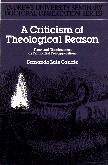|
Adobe
Reader
Seminary Student Forum
Revista Logos
"Movings
Times" Seminary in
"Exile"
Philosophy on the Web
Theology on the Web
Andrews University
Seventh-day Adventist Seminary
Seminary
Library Resources
Theological
Documents
Revelation,
Inspiration and Hermeneutics
Worship
Dissertations
online
| |
-
|
Back to
Revelation-Inspiration: Searching for the Cognitive Foundation of
Christian Theology in a Postmodern World
(Lanham, MD: University
Press of America, 2001). ($ 32.00 + shipping and handling).
ORDER
ON LINE FROM AMAZON.COM
You can order this
book also from the University
Press of America, (800-462-6420). |
|
In Models of Revelation-Inspiration, Fernando
L. Canale, analyzes the two main ways in which Christianity has
understood the origin of biblical knowledge. Canale proposes a way to
overcome them by suggesting a new model of understanding that
maximizes their strengths and avoids their weaknesses. By allowing us
to see and use biblical knowledge in a new light, the new model
uncovers a new foundation for theological knowledge. |
A Criticism of
Theological Reason: Time and Timelessness as Primordial Presuppositions.
vol. 10, Andrews University Seminary Doctoral
Dissertation Series, 10 vol. (Berrien Springs, MI: Andrews University Press,
1987). ($ 19.90 + shipping and handling).
ORDER ON LINE
FROM BARNES & NOBLE
You can order this book also from
Andrews University Press, by E-mail:
aupress@andrews.edu, or by phone: 616-471-6134. |
 |
| Throughout the history of Christianism the notion of reason and
its contribution to the formulation of theology has been interpreted in various
ways. This work studies three models of interpretation, the classical, modern
and biblical. The first chapter, philosophical in nature, focuses on the notion of
reason and its role in the constitutions of meanings. The analysis shows that
three hermeneutical presuppositions are always involved in rational operations, they
are, the ontological, epistemological, and system. These presuppositions, in
turn, assume a dimensionality or premordial presupposition about reality (Being). Chapter
two, historico- theological in nature, presents the way in which these four
working presuppositions have been interpreted in the classical and
modern schools of theology. Chapter three, biblico-theological in nature,
uncovers the way in which Scripture interprets the four hermeneutical
presuppositions of reason. The analysis shows that the classical and modern
interpretations of reason are built on the acsumption that ultimate reality is
timeless while the biblical interpretation operates on the assumption that ultimate
reality is temporal and historical. |
 
|
![]()